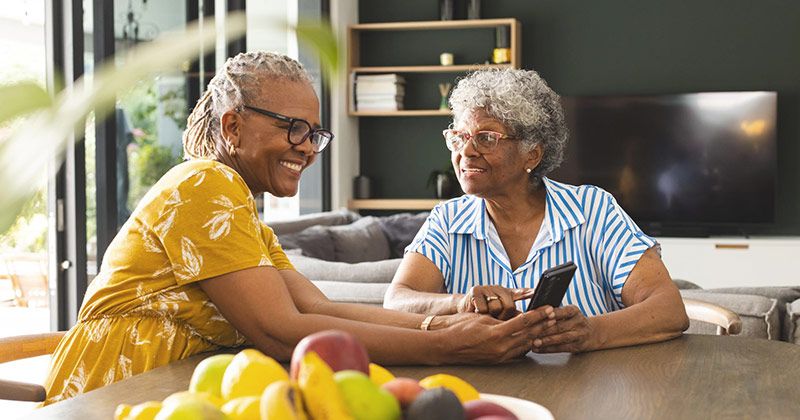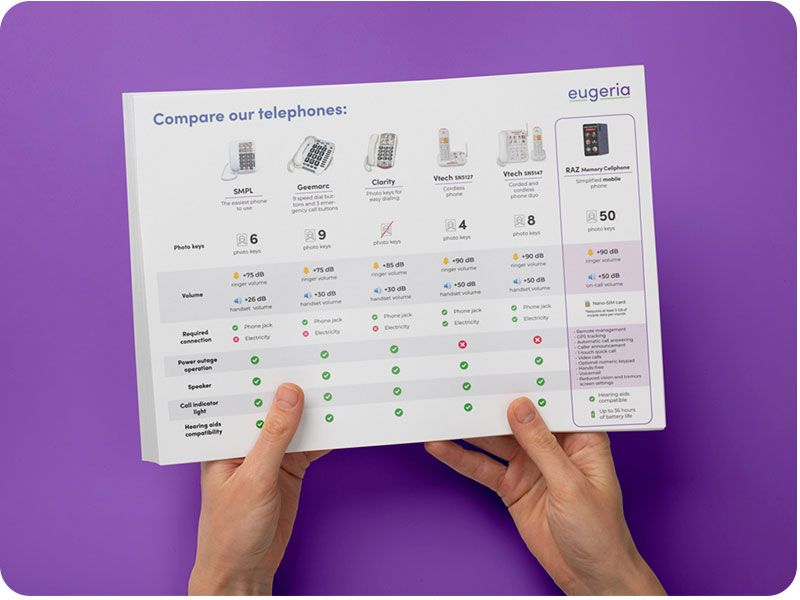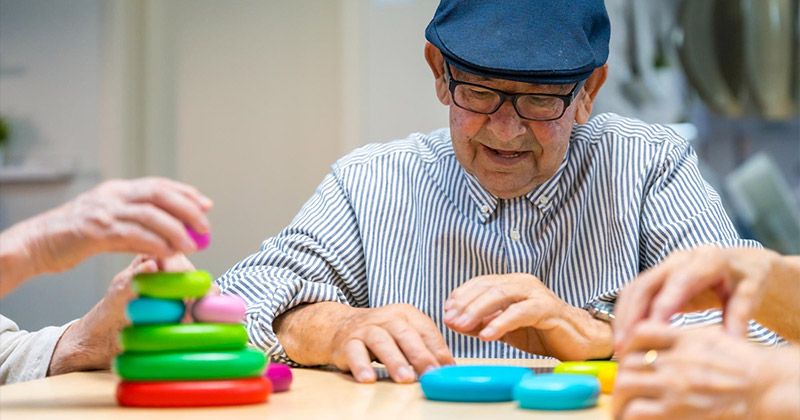Sensory products significantly improve the quality of life for individuals living with dementia by offering comfort, reducing anxiety, and enhancing well-being. This guide covers various sen...

How to choose the right adaptive phone for your loved one?
Social interaction is vital for maintaining health and well-being. As people age, their opportunities to socialize often decrease, leading to increased feelings of loneliness and isolation. This reduction in social interaction can be due to various factors such as a shrinking social circle, geographical distance from family members, or the passing of a spouse.
Staying socially active becomes challenging, which is why regular communication with elderly loved ones is crucial for their mental and emotional health.
Benefits of Regular Communication
- Alleviating Isolation and Depression: Regular communication helps seniors overcome feelings of isolation, which are common among those experiencing loss and grief. Studies have shown that isolation can have detrimental effects on both psychological and physical health, making social interaction essential for preventing depression and other related conditions.
- Reducing Anxiety: A consistent and reassuring presence, even from a distance, can help reduce anxiety in elderly individuals. Knowing that they have someone to talk to can alleviate stress and provide emotional comfort.
- Maintaining Meaningful Connections: Maintaining strong relationships is linked to improved longevity and a better quality of life. Meaningful interactions with family and friends can provide a sense of belonging, which is particularly important for seniors who may feel disconnected due to physical or geographical distance.
- Cognitive Stimulation: Engaging in regular conversations and the routine of frequent calls can stimulate cognitive function and help slow down cognitive decline. This is especially beneficial for seniors, as mental stimulation is crucial in maintaining brain health.
- Ensuring Peace of Mind: Being in regular contact with an elderly loved one ensures that they feel secure and reassured. It also provides family members with peace of mind, knowing that they are available and responsive in case of emergencies.
- Promoting a Healthy Lifestyle: Frequent communication can positively influence healthy lifestyle choices. Seniors who stay connected are more likely to engage in healthy behaviors, as they receive regular encouragement and support from their loved ones.
Addressing Common Sensory and Cognitive Challenges When Selecting a Phone
Hearing issues, such as presbycusis, can make it difficult to hear high-pitched sounds, like a phone ringing, and complicate phone conversations. Visual impairments, such as age-related macular degeneration, may hinder the ability to read the keyboard or screen, potentially discouraging seniors from using the phone. Additionally, mild to moderate cognitive impairments can impact the ability to operate complex devices or remember phone numbers, making simpler, more intuitive options more effective.
Choosing the Right Senior-Friendly Phone
Selecting a suitable phone for a senior requires consideration of several factors, especially if they experience hearing loss, visual impairment, or cognitive decline.
Criteria to Consider for Selecting a Phone for Seniors:
- Usage Needs: Determine whether the phone will be used regularly, occasionally, or only in emergencies. This helps in selecting features such as speed dialing, an answering machine, and the ability to pre-program emergency contacts, or for it to be a mobile phone instead.
- Simplicity: Depending on the user's cognitive abilities, opt for phones that offer speed dialing or photo keys, which simplify dialing by using recognizable images. This feature is particularly useful for seniors with memory impairments.
- Audio Quality: Choose phones with adjustable volume settings to accommodate hearing impairments. Look for features like amplified sound, compatibility with hearing aids, and visual indicators for incoming calls.
- Visual Features: Phones with large buttons, easy-to-read displays, and contrasting colors can be easier for seniors to use, especially those with visual impairments. Quick dial buttons with photo identification can also be helpful.
- Mobility Considerations: Depending on whether the senior is more comfortable with a fixed or cordless phone, select a model that fits their lifestyle. Cordless phones offer mobility but require recharging, while fixed phones should be easily accessible and placed in locations where the senior spends most of their time.
The Best Adapted Phones for Seniors
Below is a summary table outlining key criteria and the available options at Eugeria. Our team is excited to help you find the perfect product and is readily available to assist with any questions or guidance you may need!

Specialized Smart Phones for Seniors: Enhancing Communication and Safety
Specialized smartphones for seniors, like the Raz Memory Phone, are designed specifically for individuals with memory loss. This device features simple, picture-based dialing and automatic answering options, making communication more intuitive and accessible.
Additionally, the Raz Memory Phone offers features like video calling, which allows seniors to have face-to-face conversations with friends and family members. GPS tracking is another key feature, providing caregivers with peace of mind by monitoring their loved one's location. These functionalities work together to enhance both communication and safety for seniors.
Leveraging Technology for Enhanced Senior Communication
While phones are favored for their simplicity, modern technological innovations offer significant enhancements in connectivity for seniors.
The Idem Smart Clock is a prime example of this innovation. It features advanced communication capabilities, allowing caregivers to send messages, photos, and reminders directly to the device. This functionality helps keep seniors engaged and connected with their loved ones.
Conclusion
Technology provides a variety of communication options for seniors, but traditional phones remain popular due to their simplicity and reliability. When choosing a phone for elderly loved ones, consider their specific needs and limitations, such as hearing and vision impairments or cognitive abilities. Selecting the right device can help ensure they stay socially connected and supported, improving their overall well-being and quality of life.


